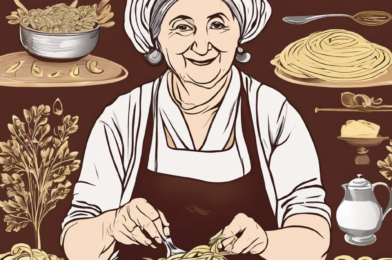Making pasta by hand may seem daunting, but with some simple tips from a Roman nonna, or grandmother, anyone can master this traditional craft. In the heart of Rome, a city steeped in culinary tradition, I had the privilege of spending an afternoon with Nonna Maria, a master of handmade pasta. With her gentle guidance and time-honored techniques, she showed me that creating delicious, authentic pasta is an art worth practicing.
As we gathered in her cozy kitchen, Nonna Maria shared her wisdom with a group of eager learners. “The secret to great pasta lies in using the finest ingredients and embracing the simplicity of the process,” she explained. Her gnarled hands skillfully mixed flour and eggs, a familiar ritual she had performed countless times. We watched, captivated, as she shaped the dough with effortless grace, her movements a soothing dance.
Nonna Maria’s first lesson was on choosing the right ingredients. She emphasized the importance of selecting high-quality flour, preferably Italian “00” flour, which is finely ground and produces a silkier dough. “The flour is the foundation of your pasta,” she advised, “so invest in the best you can afford.” Similarly, she recommended sourcing fresh, organic eggs from a local farmer to ensure rich flavor and color.
Her second tip revolved around the art of mixing and kneading. “Don’t be afraid to use your hands,” she encouraged. “Feel the dough, sense its texture, and adjust as needed.” She taught us to create a soft, elastic dough by gradually adding flour and using a gentle touch when kneading. “It’s all about patience and precision,” she smiled. “Your hands will guide you.”
Nonna Maria’s kitchen soon became a bustling workshop, with each of us trying our hand at shaping the dough. Under her watchful eye, we attempted various techniques, from rolling it thin for delicate tagliatelle to shaping plump tortellini. Her encouragement urged us on, and we felt connected to a centuries-old tradition.
“Pasta making is a labor of love,” Nonna Maria reminded us, her eyes twinkling. “It’s about sharing a piece of Italy with those you cherish.” As the afternoon sun cast a warm glow over her kitchen, we savored not just the delicious pasta we had crafted but also the warmth of Nonna Maria’s hospitality and the enduring legacy of Italian culinary tradition.
The aroma of fresh basil and garlic filled the air as Nonna Maria demonstrated the perfect marriage of pasta and sauce. “The key to a sublime sauce is freshness,” she emphasized, holding up a handful of vibrant basil leaves. She walked us through her garden, plucking ripe tomatoes and fragrant herbs. “Taste the difference the earth makes,” she said, her wrinkled hands gently caressing the plants. It was a sensory experience, and we realized that the key to Nonna Maria’s culinary magic lay in her deep connection to the land and her respect for nature’s bounty.
As we devoured our homemade pasta, relishing every bite, Nonna Maria imparted her final lesson: “The true essence of pasta making is not just in the taste, but in the love shared around the table. It is a bond that transcends generations and unites us all.” Her words lingered in the air like the comforting aroma of a hearty meal. We left her home not just with full stomachs and newfound skills but with a deeper understanding of the power of food to forge connections and preserve traditions. The art of handmade pasta, passed down from Nonna Maria, was more than a culinary skill—it was a testament to the enduring legacy of Italian culture.
Nonna Maria’s passion and knowledge inspired us to embrace the art of handmade pasta, and her tips will undoubtedly enhance your pasta-making journey. By selecting quality ingredients, embracing the sensory experience of kneading, and respecting the tradition of this craft, you, too, can create delicious, authentic pasta in your kitchen. So, roll up your sleeves, gather your ingredients, and immerse yourself in the magical world of handmade pasta, guided by the wisdom of a Roman nonna. Buon appetito!
